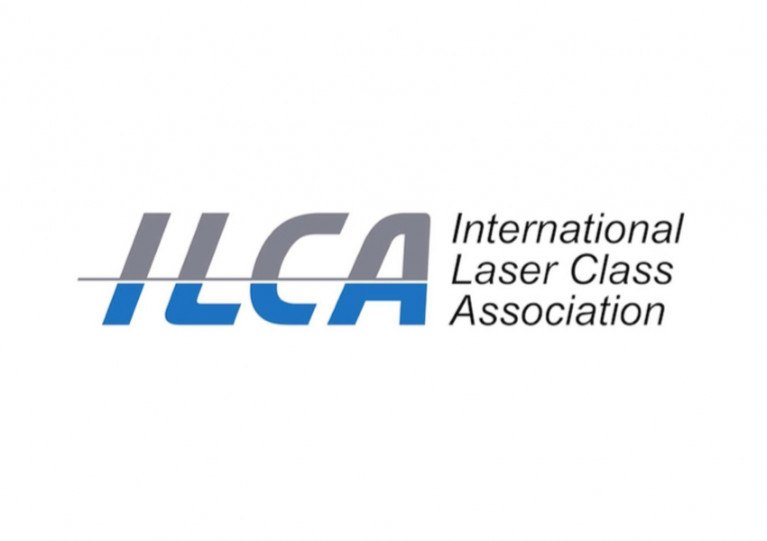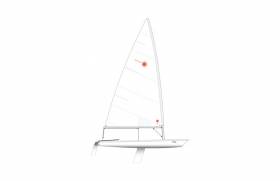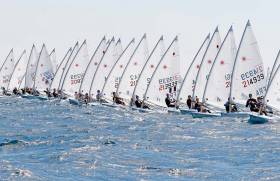Displaying items by tag: ILCA
The battle for country qualification at the ILCA Vilamoura European Continental qualifier for the Olympic single-handed dinghy will enter the final day tomorrow without any Irish sailors in contention.
Irish hopes of securing a third boat for Tokyo ended this afternoon after two breezy races in the Gold fleet.
The result is a disappointment for team Ireland who will not have a male Laser sailor at the Olympics, the first time since 2008 and the third absence since the boat was introduced to the Olympics at Atlanta in 1996.
 Ewan McMahon (HYC) Photo: Joao Costa Ferreira
Ewan McMahon (HYC) Photo: Joao Costa Ferreira
Spain is the leading contender some 33 points ahead of Netherlands with Belgium, Switzerland and Italy within shouting distance.
 Liam Glynn (Ballyholme YC) Photo: Joao Costa Ferreira
Liam Glynn (Ballyholme YC) Photo: Joao Costa Ferreira
A second black flag of the regatta in race 9 today scuppered Finn Lynch's chances in the fresh south-south easterly breezes. He followed it up with a 26th to lie 38th overall.
Other Irish results today:
- Ewan McMahon (HYC) 37, 47 to lie 51st overall
- Liam Glynn (Ballyholme YC) 47, 50 - 59th overall
Silver fleet results not available at time of report.
- Tom Higgins (RSGYC)
- Hugo Kennedy (RSGYC)
 Robert Scheidt from Brazil is back in contention in Vilamoura
Robert Scheidt from Brazil is back in contention in Vilamoura
Robert Scheidt (BRA) bounced back into 2nd place - he now lies just 14 points behind regatta leader Britain's Michael Beckett.
Country Qualification After Day 5
| Country | Pts Day 5 | Pos after Day 5 | |
| ESP | 76 | 1 | |
| NED | 109 | 2 | |
| BEL | 125 | 3 | |
| SUI | 127 | 4 | |
| ITA | 127 | 5 | |
| MNE | 141 | 6 | |
| POR | 142 | 7 | |
| GRE | 199 | 8 | |
| IRL | 220 | 9 | |
| POL | 258 | 10 | |
| TUR | 261 | 11 | |
Racing continues tomorrow. Full results here
Howth's Hopkins Leads Irish Hopes at 2021 ILCA Vilamoura European Continental Qualifier
There were mixed fortunes on day two for the Irish Women at the 2021 ILCA Vilamoura European Continental qualifier for the Olympic single-handed dinghy (M&W).
Aoife Hopkins of Howth Yacht Club climbed five places to 33rd posting a 6th and a 35th in today's two races.
Tokyo bound Annalise Murphy of the National Yacht Club scored 41st and 7th to lie 35th while Eve McMahon, HYC, is 79th after a 37th and 27th today.
The women enjoyed the better breeze in the later afternoon, but will probably have to put up with lighter breezes tomorrow as they go out ahead of the men.
Full results are here
Challenging Day Two for Irish Laser Men at ILCA Vilamoura European Continental Qualifier
Day two of the 2021 ILCA Vilamoura European Continental qualifier for the Olympic single-handed dinghy men was sailed in 12 to 15-knot south-westerlies and proved to be somewhat challenging for the Irish contingent. Leading contender Finn Lynch (NYC) was a premature starter in race 1 but recovered to record a 6th in race 2 to lie 28th overall with the drop race excluded.
Ewan McMahon (HYC) improved slightly to 48th place after race scores of 29 and 12. Liam Glynn of Ballyholme is four places back in 52nd, but it was a tough day for Royal St George teammates Tom Higgins (45, 62) and Hugo Kennedy (47, 65) who now lie in 105th and 124th respectively.
In the all-important battle for country selection for Tokyo 2020 (final two places are available), Ireland remains in 7th place, with a slightly increased deficit on points relative to second place non-qualified country.
If the organisers continue the trend of alternating the start times, the men, who started first today, will likely enjoy stronger breezes later in the afternoon tomorrow.
Wednesday marks the halfway stage of the regatta and Ireland now has little room for error in the remaining eight races to come.
The country qualification position after day two is expressed in the table below where lower points are better.
| Country | Points |
| ESP | 16 |
| BEL | 18 |
| NED | 18 |
| ITA | 21 |
| SUI | 27 |
| POR | 38 |
| IRL | 39 |
| GRE | 40 |
| MNE | 43 |
| POL | 51 |
| TUR | 60 |
| LTU | 93 |
| DEN | 95 |
| UKR | 112 |
| CZE | 115 |
| ISR | 126 |
Full results are here
After a long period without major regattas due to the pandemic situation, many of the top sailors, even from qualified countries, are competing at this event.
Organised by Vilamoura Sailing, this qualifier event is held for European countries to claim their remaining four slots for the Tokyo Olympic Games: two in the women's ILCA 6 fleet and two in the men's ILCA 7 fleet. There are seven countries competing for the two ILCA 6 Olympic tickets, and 17 countries vying for the two ILCA 7 slots.
150 sailors from 34 countries were able to come together for this event, as Vilamoura continues to be one of the few places in the world right now where sailing competitions are open.
Brazil's Robert Scheidt Leads European ILCA Olympic Qualifier, Ireland's Finn Lynch is 27th
At the age of 48 and with five Olympic medals and nine Laser World Championship titles, Brazil's Robert Scheidt leads the European Olympic Qualifier for the men's single-handed dinghy being competed for in Vilamoura, Portugal. Schiedt scored seconds in both of today's races to lead by a point.
Finn Lynch (NYC) leads the Irish contingent with a 28th and 5th to lie 27th overall, while Ewan McMahon (HYC) is in 50th place after race scores of 28 and 25. Liam Glynn of Ballyholme is a further seven places back (11th, 49th) while Tom Higgins (RSGYC) is 100th (49, 47) and his clubmate Hugo Kennedy is in 124th after two 59s.
ILCA 7 Country Olympic Qualification Position
In the all-important battle for country selection, where the top two of those not yet qualified will book tickets to Tokyo, the situation after day one is best expressed by the table below where lower points are better.
So five countries between Ireland and that all-important second place but it's early days and there are plenty of races left to sail till Saturday.
| Country | Points |
|---|---|
| ESP | 14 |
| BEL | 15 |
| SUI | 17 |
| NED | 21 |
| POR | 26 |
| GRE | 29 |
| IRL | 33 |
| ITA | 36 |
| TUR | 37 |
| MNE | 39 |
| POL | 43 |
| UKR | 73 |
| DEN | 74 |
| ISR | 77 |
| LTU | 84 |
| CZE | 84 |
Full results are here
After a long period without major regattas due to the pandemic situation, many of the top sailors, even from qualified countries, are competing at this event.
Organised by Vilamoura Sailing, this qualifier event is held for European countries to claim their remaining four slots for the Tokyo Olympic Games: two in the women's ILCA 6 fleet and two in the men's ILCA 7 fleet. There are seven countries competing for the two ILCA 6 Olympic tickets, and 17 countries vying for the two ILCA 7 slots.
150 sailors from 34 countries were able to come together for this event, as Vilamoura continues to be one of the few places in the world right now where sailing competitions are open.
The International Laser Class Association (ILCA) has announced its provisional list of new builder applicants for Laser class boats amid a process that began last autumn.
Manufacturers that have been approved to move forward in the application process are, in alphabetical order: Devoti Sailing in Poland; Element 6 Evolution in Thailand; Nautivela in Italy; the UK’s Ovington Boats; Qindao Zou Inter Marine in China; Argentina’s Rio tecna; and US firm Zim Sailing.
These applicants will now be subject to a further technical review to ensure compliance with the class one-design principles.
They will be required to obtain certified moulds and tooling from the ILCA and produce a number of pre-production boats to verify adherence to the strict specifications.
Meanwhile, under the terms of the Olympic Equipment Policy, there are other applicants in the approval process at this time that may also receive provisional approval at a future date.
At present the list does not include Laser Performance, which was removed as an approved builder in early 2019 over alleged breaches of the ILCA construction agreement.
Later the governing body announced the new ‘ILCA Dinghy’ title for class-approved boats, a move reportedly made necessary as Laser Performance holds the trademark to the ‘Laser’ name.
International Laser Class Association Now Accepting New Builder Applications
With the selection of the Laser class for the Olympic men’s and women’s single-handed dinghy events from Paris 2024 comes significant change to align with new class requirements, as Scuttlebutt Sailing News reports.
Previously restricted to a handful of licensed builders internationally, the International Laser Class Association (ILCA) must now abide by World Sailing rules which mandate that all selected equipment be open on a FRAND (fair, reasonable and non-discriminatory) basis to any party to manufacture and sell, so long as they meet the necessary technical qualifications.
As a result, the ILCA class rules now “allow builders and suppliers to manufacture and sell class-legal equipment under alternative trademarks, as long as all equipment is compliant with the construction manual”.
In a statement announcing the change and their welcoming of new builder applications, the ILCA says: “A cornerstone principle of our class that remains enshrined in the new policy is that all boats and equipment sold by the class builders and used in class racing must be made in strict compliance with the specification of the class construction manual.
“ILCA is committed to continuing this strict one-design principle and ensuring that all new and existing manufacturers maintain the highest uniform standards.”
The body maintains that the Laser class “will remain what it has always been, a mass-produced one-design boat built within construction tolerances set down to allow for the mass production process”.
“No attempt at optimization of the boat or equipment within the allowable tolerances will be permitted and all boats must be constructed from molds and tooling certified by the class, as they have been in the past,” it says.
Starting immediately, a “multi-stage formal application process” will enable ILCA to “identify new builders that have the relevant expertise, experience, competence and business strength to meet the class builder requirements”.
The shift follows disarray in the class earlier this year after Laser Performance was removed as an approved builder over alleged breaches of the ILCA construction agreement. Subsequently the governing body announced the new ‘ILCA Dinghy’ title for class-approved boats, a move reportedly made necessary as Laser Performance holds the trademark to the ‘Laser’ name.
Laser Class-Approved Boats Get New Name
The International Laser Class Association (ILCA) has announced that effective from yesterday, Thursday 25 April, all new class-approved boats will be sold and raced under the new name ILCA Dinghy.
Scuttlebutt Sailing News has more on the move which comes just weeks after the ILCA removed longtime builder Laser Performance as an approved builder, claiming that it had breached the terms of its construction agreement.
The name changed was made necessary as Laser Performance — for which CH Marine is the official Irish dealer — holds the trademark to the ‘Laser’ name, it’s been reported.
Laser-class boats are manufactured under licence by a variety of builders around the world, under strict guidelines to maintain their identical standards.
The class has been the one-person dinghy event at the Olympic Games since Atlanta 1996 but its future after next year’s games in Tokyo has not been confirmed.
“It’s a big change for a racing class that hasn’t seen anything like this in our almost 50-year history,” said class president Tracy Usher of the name change.
“Our staff and our network of stakeholders have been working tirelessly to ensure minimal disruption to ILCA members and class racers in all regions of the globe.”
Usher said the name change will apply to all three rig sizes allowed by the ILCA Class Rules (Standard, Radial and 4.7 rigs).
In addition, new class-legal sails for each rig will carry the updated ILCA logo, a move which is fully supported by North Sails.
Usher added that delivery times to Europe “may see a slight increase” since the two remaining approved class builders are located in Japan and Australia, serving markets in east Asian and Oceania.
The ILCA has posted an FAQ about its recent changes, and Sailing Scuttlebutt has much more on the story HERE.
Kirby Makes Moves To Stop Laser Production
#Laser - The designer of the iconic Laser is putting pressure on the boat's manufacturer for the UK, Europe and North America to halt all production of the vessel, as Marine Business World reports.
Bruce Kirby has previously filed a complaint in the US Federal Court District of Connecticut alleging the unauthorised production of his design and non-payment of royalties by LaserPerformance, the company licensed to build Laser class boats for the western market.
It's now being reported that yesterday (17 May), Kirby's company Kirby Inc has sought a court order to issue a prejudgement remedy against LaserPerformance, which would prevent that or any associated company from building Lasers while the court assesses the case.
The International Laser Class Association (ILCA) and the International Sailing Federation (ISAF) are also named in Kirby's lawsuit for allegedly assisting LaserPerformance by supplying ISAF plaques despite being given formal notice to cease by Kirby.
In April, Kirby took the sailing world by surprise with the news that he had relaunched his classic single-handed one design under a new brand, the Kirby Torch.
The new company's website cited "supply of the Kirby sailboat and parts to sailors worldwide" as the issue for its terminating of previous manufacturing deals at the end of last year.
Laser Designer Launches Iconic Boat Under New Name
#Laser - The sailing world has been taken by surprise with the news that the designer of the Laser has launched his iconic design under a whole new brand amid allegations over royalty payments.
Bruce Kirby - whose single-handed one-design has become a staple at the Olympic Games - has apparently signed all new builder agreements to manufacture his rechristened Kirby Torch design, after terminating his previous deals at the end the last year.
"The issue is supply of the Kirby sailboat and parts to sailors worldwide," according to the Kirby Torch website. "After numerous attempts, Bruce Kirby felt he had no choice but to withdraw Laser brand building rights in North America and Europe."
It's alleged that lack of royalty payments for the design by at least one top manufacturer prompted the move by Kirby to strike out on own, but nothing has been confirmed as of this time.
It is also not known exactly what the consequences will be for currently sailed Lasers and for the International Laser Class Association (ILCA), although the Kirby Torch website states that all ISAF-plaqued Lasers are class legal under the renamed fleet.
More on this story as it develops...


































































